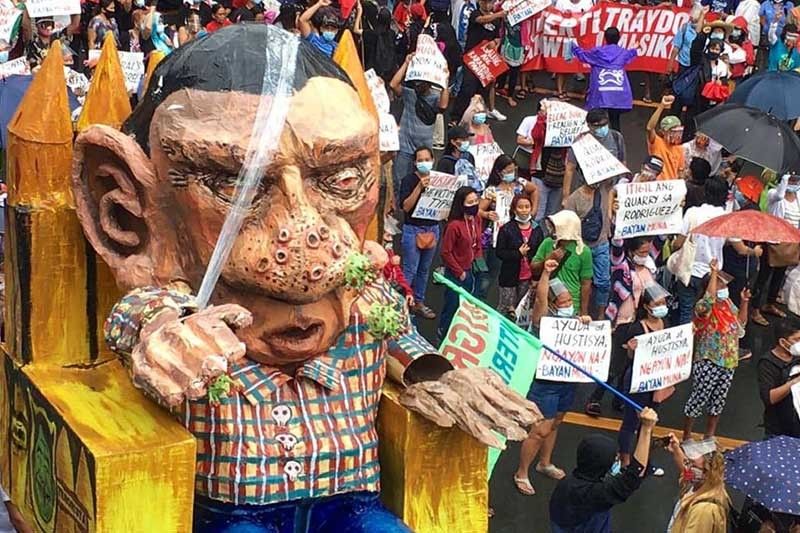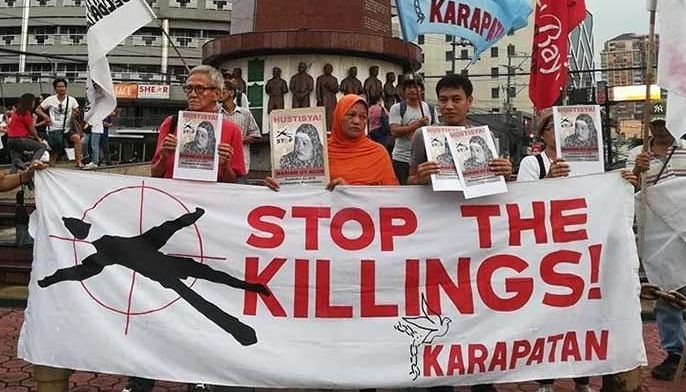New messaging, strategies can help rights groups win public support — study

MANILA, Philippines — Human rights groups must invest in communications strategies and staff to reach a broader public in the face of government messaging that has made their advocacy a topic that many turn away from and even fear, new research shows.
According to "Human Rights in Survival Mode," a study published by the Harvard Kennedy School, the inability or refusal of some groups to adjust their messaging has made human rights campaigns and the workers behind them more vulnerable to disinformation and vilification.
'Recycling Martial Law era rhetoric'
Citing interviews with rights workers and with respondents from media and public relations, researchers Jonathan Ong, Jeremy Tintiangko and Rossine Fallorina said "many human rights organizations have anchored education on political and civil rights in the martial law era, but have not expanded to address economic and social rights issues that are more pressing and relevant to Filipino society today."
Respondents from non-governmental organizations, they said, believe that some of the protest language that seeks to cast President Rodrigo Duterte "as dictator" to incite public outrage appear to be recycled Marcos-era slogans.
READ: In 2017 Duterte shunned dictator tag; now he embraces it
NGO workers pointed out that while the sector has memorialized the revolution that toppled dictator Ferdinand Marcos, it was not internalized by the public in the same way.
"This failure to develop persuasive human rights narratives that meaningfully engage with the majority of the population makes it difficult for people to connect with the human rights sector, as they fail to address urgent concerns such as fair and livable wages," the researchers said.
"Education is a right. Food is a right," a program officer from a rights NGO is quoted in the study as saying. "But the public thinks that human rights is all these civil and political liberties only.”
Communication plays 'peripheral' roles in some rights groups
"While human rights workers diagnose the roots of the sector’s crisis quite differently, they all point to many communication-related problems," Ong and his colleagues said.
While all the respondents said social media rewrote the "rules of the game" for human rights campaigning, the researchers said they saw "limited evidence that structural investments have been made to support strategic communication in organizational practice and everyday work routines."
For example, of the 30 rights organizations they interviewed, 46% had no full-time communications staff.
These NGOs, they said, assign communications as add-on tasks to program officers responsible for legislative lobbying or community interventions.
"These staff members are rarely supported with additional training, equipment such as digital cameras, or bonus pay."
Six, or 20%, of the 30 NGOs interviewed employed five or more communications workers. The remaining 10 organizations, or 34%, were equally divided between employing either one communication staffer or between two to five.
"What our research uncovers is that despite their many creative experiments to connect with diverse constituencies, human rights organizations have still failed to invest material resources in sustainable communication infrastructures and empower their communication personnel," the researchers said.
"Almost half of the organizations we interviewed still had no staff member dedicated to communication or branding; communication workers continued to play peripheral roles in their organizations."
What makes communication strategy effective?
The researchers defined "strategic communication" as having the following components:
- communication workers in empowered leadership roles that direct campaign strategies
- creative and multimodal communication campaigns with messages taken forward in diverse and appropriate media platforms
- strategic organizational branding with flexibility when responding to crisis events
- established and sustained relationships with allies in advertising/public relations/academe in order to monitor disinformation and various communication activities
"In a time of information warfare, human rights organizations need to exert control over political narratives and engage with mainstream publics," they emphasized.
Among their other recommendations was for rights groups to "engage with, rather than avoid, the public sentiments of the populist political moment."
"Rather than simply double-down on liberal progressive values, or personalize the issue to Duterte, human rights organizations can invest in more listening projects that deepen their understanding of populist publics’ fears and anxieties."
The researchers also said that rights NGOs can "balance their predilection for gloom-and-doom and attack narratives with more hopeful, issue-based campaigns that can mobilize broader communities."
"By painting vivid images of a common future that must be desired and the practical goals that can lead toward that, organizations may be able to inspire mainstream publics to take part in human rights work." — with Jonathan de Santos
- Latest
- Trending






























